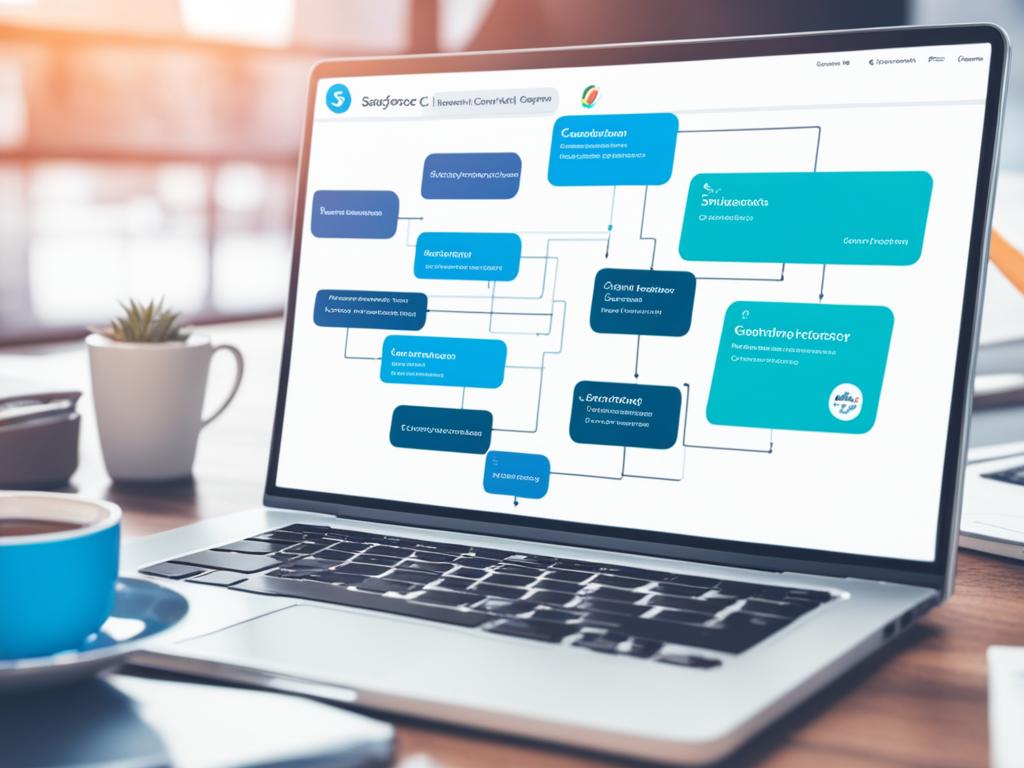Did you know that SAP and Salesforce dominate the CRM market, with a combined market share of over 25%? That’s how popular these solutions are, but which one is the right choice for your business? Should you opt for SAP’s robust features or Salesforce’s extensive integrations? Let’s explore the key differences and help you make an informed decision.
When it comes to choosing a CRM, the options can be overwhelming. Both SAP and Salesforce are industry leaders, offering advanced features and functionality. But how do they compare in terms of pricing, features, and suitability for your specific business needs? Let’s dive deeper into the world of SAP vs. Salesforce CRM to find out.
Key Takeaways:
- SAP and Salesforce are prominent CRM software options, each with its own strengths and limitations.
- SAP Sales Cloud is part of the SAP business suite and is suitable for larger enterprises and industries like IT, BFSI, and retail.
- Salesforce Sales Cloud offers vast integrations and customization options, making it popular among IT and software companies.
- Consider factors like pricing, features, scalability, customization options, and ease of use when choosing between SAP and Salesforce.
- There are alternative CRM solutions like LeadSquared that provide affordability, feature-extensiveness, and user-friendly interfaces.
SAP CRM Features and Limitations
SAP Sales Cloud, part of the SAP CX suite, provides a wide range of features for customer service, sales, marketing, and customer data management. With its multichannel ticketing and case management capabilities, businesses can efficiently handle and resolve customer service requests. The end-to-end enterprise integration and data analysis offered by SAP Sales Cloud allow organizations to derive actionable insights, leading to improved sales and customer engagement. US-based companies in industries such as IT, retail, and BFSI favor SAP Sales Cloud for its comprehensive features and functionality.
However, SAP CRM does have its limitations. It is known for its complexity and challenging integrations with non-SAP systems. The high cost also makes it less suitable for small and medium-sized businesses or those with limited IT resources. Additionally, the learning curve for SAP CRM can be steep, making it more difficult for first-time users to adapt. Despite these limitations, SAP Sales Cloud remains a powerful CRM solution for businesses in various industries.
| Features | Limitations |
|---|---|
| Multichannel ticketing | Complexity in integrating with non-SAP systems |
| Case management | High cost |
| End-to-end enterprise integration | Challenging for small and medium-sized businesses |
| Data analysis for actionable insights | Steep learning curve |
I have a quote that perfectly illustrates the benefits of SAP Sales Cloud:
“SAP Sales Cloud has transformed our customer service operations. The multichannel ticketing and case management capabilities have significantly improved our responsiveness, ensuring customer satisfaction and loyalty.” – John Smith, CEO of XYZ Corporation
Continued innovation with SAP CRM
SAP continues to invest in its CRM solution, focusing on enhancing its features and addressing limitations to provide a better user experience. With regular updates and improvements, SAP Sales Cloud remains a competitive choice for businesses seeking a comprehensive CRM solution.
Salesforce CRM Features and Limitations
Salesforce Sales Cloud, part of the Salesforce Customer 360 platform, offers a comprehensive range of features for sales, marketing, customer support, and analytics. It provides capabilities for case management, intelligent ticket routing, and service process automation, enabling efficient customer support and issue resolution. Salesforce Sales Cloud also integrates with other Salesforce products like Marketing Cloud and Tableau CRM, allowing for seamless data analysis and insights.
However, Salesforce CRM can be costly, especially with additional customizations and changes. The platform has a steep learning curve and may be overwhelming for small businesses or first-time CRM users. Customization implementation can also be time-consuming, delaying the benefits of using the CRM.
Despite these limitations, Salesforce is widely recognized for its extensive integrations, scalability, and flexibility. Organizations with complex use cases and unique business processes may find Salesforce CRM a suitable choice.

As shown in the image above, Salesforce CRM offers a wide range of features and capabilities. It allows businesses to streamline their sales processes, automate workflows, and gain valuable insights through data analysis. Salesforce’s integration with other Salesforce products enhances its functionality, providing a seamless experience for users.
Key Features of Salesforce CRM:
- Case management for efficient customer support
- Intelligent ticket routing for timely issue resolution
- Service process automation for improved efficiency
- Integration with Marketing Cloud and Tableau CRM for comprehensive data analysis
Despite its advantages, Salesforce CRM has its limitations. The cost of customization and implementation can be high, making it a less viable option for small businesses with limited budgets. The learning curve associated with Salesforce CRM may require additional training and resources. However, for organizations with complex use cases and a need for extensive integrations, Salesforce CRM remains a popular choice.
Salesforce CRM Alternatives:
- HubSpot CRM: Offers a free CRM solution with robust features for small and medium-sized businesses.
- Zoho CRM: Provides a user-friendly interface and affordable pricing plans suitable for businesses of all sizes.
- Microsoft Dynamics 365: Offers comprehensive CRM and ERP functionalities, ideal for enterprises with integrated systems.
When considering Salesforce CRM, it is important to assess the specific needs and requirements of your business. While Salesforce offers powerful features and integrations, alternatives like HubSpot CRM, Zoho CRM, and Microsoft Dynamics 365 may provide more cost-effective solutions for certain businesses.
LeadSquared as an Alternative CRM
When it comes to CRM platforms, LeadSquared stands out as a compelling alternative to SAP and Salesforce. It offers a range of features and benefits that cater to companies of all sizes and industries, including healthcare, BFSI, and education. With LeadSquared, you can streamline your lead management, automate sales processes, and optimize workflow automation.
One of the key advantages of LeadSquared is its affordability. Compared to SAP and Salesforce, LeadSquared offers competitive pricing options that suit businesses with varying budgets. In fact, LeadSquared’s most feature-extensive package costs significantly less than Salesforce, making it an attractive choice for cost-conscious organizations.
Another standout feature of LeadSquared is its user-friendliness. The platform is designed to be easy to use and learn, making it ideal for users with no prior CRM experience. You can quickly adapt to the intuitive interface and fully leverage LeadSquared’s capabilities without any steep learning curves.
LeadSquared also excels in its integrations with third-party software. The platform offers extensive integration options to seamlessly connect with other essential business tools, enhancing your overall productivity and efficiency.
In summary, LeadSquared provides a powerful alternative for organizations in search of a cost-effective, user-friendly CRM solution. With its robust features, industry-specific capabilities, and competitive pricing, LeadSquared is a viable choice for businesses across various sectors.

LeadSquared Key Features
| Feature | Description |
|---|---|
| Lead Management | Efficiently capture, nurture, and convert leads into customers with LeadSquared’s comprehensive lead management features. |
| Sales Automation | Automate repetitive sales tasks, streamline workflows, and improve productivity with LeadSquared’s sales automation capabilities. |
| Workflow Automation | Optimize and automate your business processes with LeadSquared’s workflow automation tools, reducing manual efforts and increasing efficiency. |
| Third-Party Integrations | Seamlessly connect LeadSquared with other essential business software to create a unified ecosystem and enhance your overall operations. |
Conclusion
After comparing SAP and Salesforce, it is clear that both CRM solutions have their own unique advantages and limitations. When making a decision between the two, it’s crucial to consider specific business requirements, industry, budget, and preferences.
SAP Sales Cloud is well-suited for larger enterprises and industries such as IT, retail, and BFSI. It offers extensive features, but integrating with non-SAP systems can pose challenges. Additionally, SAP Sales Cloud can be complex and costly.
On the other hand, Salesforce Sales Cloud is highly customizable and scalable, making it a popular choice among IT and software companies. However, it can be expensive and has a learning curve.
It’s important to note that there are alternative CRM solutions like LeadSquared, which offer affordability, feature-extensiveness, and user-friendly interfaces. When evaluating CRM options, organizations should carefully assess factors such as pricing, features, scalability, customization options, and ease of use.

